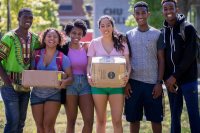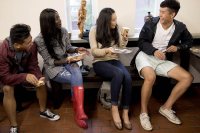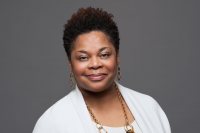
Shatter stereotypes, black and Latino male students told

Participants in a Bates-hosted conference for black and Latino male students. Photograph by Simone Schriger ’14.
What do black and Latino male students at Bates, Bowdoin and Colby colleges have in common, besides race, gender, general age and the fact that they’re all at top private liberal arts colleges in Maine?
The answers that emerged during a March 3 all-day conference at Bates for such students were:
• Despite being among the elite of American college students, they — like students in these categories at all kinds of colleges and universities — find themselves encountering a form of self-fulfilling prophecy throughout their college experience: negative stereotypes of their groups that assume they don’t have the intellectual abilities or discipline that many other students do; an assumption that can seriously damage their self-confidence early on and limit their achievement.
• As students at elite colleges, they are particularly well-positioned to take on and defeat these stereotypes, achieving their full potential, if they recognize in advance that they’re going to encounter them, refuse to accept them, then work individually and in unison to demonstrate their falsehood.
Read some advice from the summit.
More than 40 participants discussed the particulars of these challenges and opportunities during “To the Summit: A Conference of Black and Latino Men from Colby, Bates and Bowdoin Colleges.” The group included 18 students from Bates, eight from Colby and seven from Bowdoin, plus faculty, deans and alumni from each school.
The day included individual and group presentations, interspersed with breakout sessions where the students could discuss what they’d heard, with both the speakers and each other.
The idea for the conference came about during an earlier, similar conference involving more schools, organized by the Consortium on High Achievement and Success (CHAS) and held at the College of the Holy Cross in Worcester, Mass., in November 2011. Bates, Bowdoin and Colby students at that conference decided they would benefit from a gathering for black and Latino men from those schools and began working to make it happen, said Cristian Ruiz, a Bates senior from El Paso who was one of the organizers of the conference.
While the conference was a student-driven effort, organizers found plenty of support from administrators and faculty at the three schools, including their presidents and deans of students, said Roland Davis ‘92, director of the Bates Office of Intercultural Education and associate dean of students.
“The goals are to increase resiliency and create networking opportunities for these students,” Davis said. One immediate measurement of success, he said, would be whether participants feel and display increased self-confidence as they prepare for exams this semester.
Practices to live by:
self-awareness, high goals, confidence, discipline — and no excuses
The opening presentation by David Wall Rice, a professor of psychology at Morehouse College who works to understand and elicit “behavioral bests,” set the tone for the day. Rice provided a detailed analysis of an array of societal factors or “agencies” that tend to convince young black and Latino men that they are “the cultural other” and “less than” — including a lot of popular culture such as music and film that “allow for the persistence of the ‘Invisible Man’” (a reference to the famous 1952 novel by Ralph Ellison that examined issues facing African Americans in his era).
Rice also offered an array of strategies for overcoming myths and stereotypes, based on the work of his Identity Orchestration Research Lab at Morehouse. Underlying all the strategies was a focus on what he calls personality “orchestration”: being simultaneously “visible, balanced and healthy.”
An alumni panel featured two African American alumni — 1992 Bates graduate Robb Brown and 1998 Colby graduate Jay Scott-Harris— and one Latino alumnus, 2000 Bowdoin graduate Hajmil Carr; all of them successful entrepreneurs.
The alumni were candid about the stereotype challenges of both their days as college students and their business careers, offering many personal examples. Their stories about the business world demonstrated that even very successful careers involve encounters with adversity — sometimes heavy doses of it — and after a loss, winners immediately start looking for the next success. They urged the students to begin networking in college, rely heavily on the thinking skills their educations will cultivate and have great confidence in themselves.
A faculty panel was equally encouraging. Joseph Atkins, visiting assistant professor of psychology and coordinator of multicultural student programs at Colby, strongly recommended finding a faculty or administrative mentor and listening carefully to their advice on succeeding in studies. Tashia Bradley, associate dean of students at Colby, added that women can be very effective mentors for men, provided that men don’t impose their own stereotypes on women mentors, effectively trying to convert them into either mother figures or romantic interests. Marcus Bruce, a 1977 graduate of Bates who is now the institution’s Benjamin E. Mays Professor of Religious Studies, urged the students to find a “calling” and follow it devotedly. Brian Purnell, assistant professor of Africana studies at Bowdoin, urged the students to embrace being intellectual and deal with race-based questions.
The event concluded with a dinner presentation by Ozzie Jones, a 1992 Bates graduate who has become a successful theater and film writer and director. Focusing on the current state of opportunities and challenges for young black and Latino graduates of schools like Bates, Bowdoin and Colby, he contended that they have more opportunity than ever, though they may still face oppression and injustices — and many of their peers with less outstanding educations will encounter far more. “‘The machine’ [society’s power structure] loves ya’ll!,” he said several times. In the end, he added, participants have no excuse for holding themselves to any standard lower than great success.
Where to from here?
At the end of the day, just before a concluding dinner, Bates’ Ruiz was pleased with the results: “I found this to be a great group, and I found that the sense of estrangement I’ve often felt before and in college is not unique. We got really practical advice from people who’ve walked this path before us. The day has gone really well.” Ruiz added that he’s hoping the conference will become an annual event.
Jarred Kennedy-Loving, a Bowdoin first-year student from Boston, concurred. “I’m so happy today with everything we heard and discussed here,” he said. “Now it’s all about initiative: What are you going to do with what you learned here? At the end of the day, I want to make a difference on my campus.”




